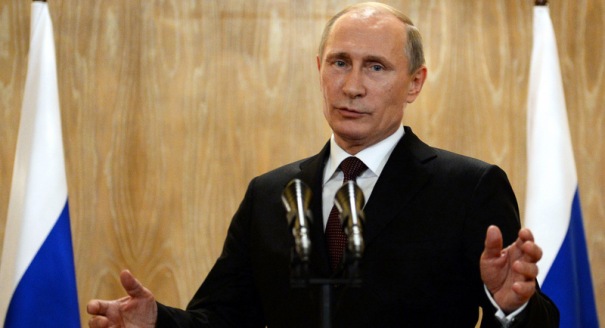As was expected, President Putin’s October 24 speech at the Valdai Forum in Sochi has caused quite a stir in the global media community and Russian and Western political circles. However, his address can in no way by compared to Winston Churchill’s Fulton speech from May 1946, despite the parallels drawn by the regime’s sycophants in Russia and Putin’s adversaries in the United States. The Sochi speech is extremely complex and admittedly objectionable. Some of its most controversial passages may merit separate analysis. But it is clearly not a declaration of a new Cold War between Russia and the West. In this way, it significantly differs from the Fulton speech which is still remembered as such after almost 70 years.
The passages on nuclear weapons do not fit traditional Cold War rhetoric at all. Putin was absolutely right in denouncing the U.S. withdrawal from the Anti-Ballistic Missile treaty, which has undermined the foundations of the strategic arms limitation process that had endured for thirty years. Besides being harmful to U.S.-Russian relations, this was one of the most foolish strategic decisions Washington has ever made. So far, no global missile defense has been built, and none will be built in the foreseeable future—at least as it relates to countering the threat from Russian and even Chinese strategic forces (although 70 percent of missile defense elements are deployed in the Pacific).
But here is the most unexpected passage of the Sochi speech: “We insist on continuing talks; we are not only in favour of talks, but insist on continuing talks to reduce nuclear arsenals. The less nuclear weapons we have in the world, the better. And we are ready for the most serious, concrete discussions on nuclear disarmament—but only serious discussions without any double standards.” We have not heard such statements from Putin in many years. On the contrary, he has made countless statements about “keeping nuclear gunpowder dry,” about nuclear deterrence as an indispensable element of security, or about the impossibility of further nuclear arms reductions.
Putin’s words are particularly remarkable in light of the fact that President Obama removed this issue from the American agenda altogether after his calls for nuclear disarmament repeatedly fell on deaf ears in Moscow.
Putin further explained what he means by a serious discussion on this issue: “Today, many types of high-precision weaponry are already close to mass-destruction weapons in terms of their capabilities, and in the event of full renunciation of nuclear weapons or radical reduction of nuclear potential, nations that are leaders in creating and producing high-precision systems will have a clear military advantage. Strategic parity will be disrupted, and this is likely to bring destabilization. The use of a so-called first global pre-emptive strike may become tempting. In short, the risks do not decrease, but intensify.”
The high-precision weapons’ capability should not be overstated. The U.S. Prompt Global Strike program encompasses numerous hypersonic missile technologies, whose destructive capabilities will not even remotely approach those of nuclear weapons, neither in terms of a disarming strike against hardened targets (such as missile silos and command centers) nor in terms of the strikes against industrial and residential areas.
Nevertheless, Russian officials are quite justifiably concerned about the entire cluster of such American projects. Russia substantially lags behind the United States in this sphere, and the declining status of nuclear deterrence, upon which Russia so heavily relies, can indeed be a cause of concern. The new systems will significantly complicate the estimates of strategic balance and the sufficiency of deterrence forces. These programs will cause even greater complications at the new arms control talks and may even compromise existing treaties (the 1987 INF Treaty and the 2010 New START Treaty). Assuring control over long-range, high-precision conventional systems is an important condition for the negotiations on strategic nuclear forces, which was clearly implied by Putin. It should become a subject in future negotiations, technical regulations, and confidence-building and transparency measures.
Putin’s statements on weapons of mass destruction may have been just a figure of speech or a tactical move to offset his harsh criticism of the United States. But it may well be an invitation to a “serious discussion” with Washington. Despite the disagreements over Ukraine, strategic nuclear and missile stability is too serious to be tied to other issues of cooperation. On the contrary, it has become far more important and relevant in today’s tense atmosphere.





